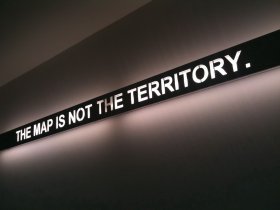General semantics and Psychology
 Editor’s note: Thank you to for developing and providing this article.
Editor’s note: Thank you to for developing and providing this article.
What is General Semantics?
General Semantics is an over-arching field that tries to integrate: a) what we know about ourselves, b) what we know about the world around us, and c) what that tells us about how we need to be evaluating our experiences. So it includes the physical sciences as well as what’s going on inside of ourselves from a physiological and neurological standpoint. The goal is to derive a pattern of behavior that’s consistent with what we know about how the brain works and how the world around us works. We have imperfect sense organs, and what we think we see is really more of an inference. We are continually going through an assembly process in terms of understanding the world.
General Semantics provides a way to construct your own worldview from an empirical basis, and be aware of our biases. The way we make sense of our experiences is through language, and in order to make our language meaningful, we need to understand some of its limitations. Some people repeat aphorisms mindlessly like “It was just meant to be” or “There is a reason for everything” without having any defensible or deliberate basis. What is important is not only what you believe, but why you believe it. In this way General Semantics is like critical thinking, and can almost be seen as a vaccine to modern day advertising and public relations.
How did General Semantics start and why haven’t I heard about it before?
General Semantics was first developed by Alfred Koryzbski, a Polish immigrant to the United States, who published Science and Sanity in 1933. He is famous for saying “The map is not the territory”, referring to how language serves as a map of the territory of our experiences. General Semantics was best popularized by S. I. Hayakawa (past President of San Francisco State University and ex-U.S. Senator), who wrote Language in Thought and Action, probably the most widely read textbook on General Semantics.
|
Databases, Information Systems, and Peer-to-Peer Computing: First International Workshop, DBISP2P, Berlin Germany, September 7-8, 2003, Revised Papers (Lecture Notes in Computer Science) Book (Springer) |



